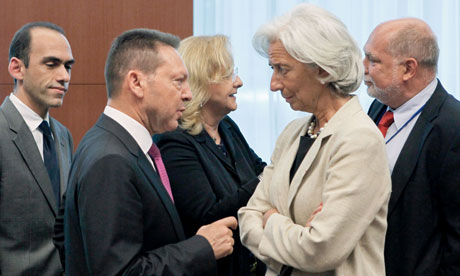Ian Traynor in Brussels The Guardian, Tuesday 9 July 2013 05.23 AEST
Meeting of euro zone finance ministers decides on €2.5bn in loans this month plus a further €500m in October
The Greek finance minister, Ioannis Stournaras, talks with the IMF managing director, Christine Lagarde, before the meeting of euro zone finance ministers in Brussels. Photograph: Xinhua/Sipa USA/Rex Features
Greece's euro zone creditors threw the battered country a summer lifeline on Monday evening, deciding to give Athens €3bn (£2.58bn) between now and October to prevent a fresh eruption of the sovereign debt crisis, while piling the pressure on the government to further slash jobs and spending.
Greece is to get a new €2.5bn in loans this month plus a further €500m in October, a meeting of euro zone finance ministers decided. In addition, the European Central Bank is to return €2bn in profits earned from Greek bonds while the International Monetary Fund is expected to supply €1.8bn in August .
With ultimatums and deadlines being set by the euro zone in advance of Monday evening's meeting of finance ministers of the 17 countries, last-minute negotiations resulted in a tentative green light to release more bailout funds.
Talks over the weekend between the Greek government and the troika of officials from the European commission, the European Central Bank and the International Monetary Fund resulted in a last-minute agreement on a new package of spending cuts, job losses and fiscal reforms in Greece in return for the bailout funds.
But Germany wanted to increase the pressure on Athens, hold it to benchmarks on the implementation of reforms and calibrate the release of bailout money to tangible results.
While Pierre Moscovici, the French finance minister, went into the meeting expressing his confidence that new loans would be disbursed, his German counterpart, Wolfgang Schäuble, made no mention of money, emphasising that first the ministers would need to study the fine print of the latest troika-Greek government deal.
Schäuble said: "It will remain difficult for Greece." He added that the latest report on Greece from the troika would be "very precisely assessed."
The Europeans and the IMF have long been at odds on the terms and targets of the Greek bailout, worth €240bn in total, the world's biggest, with the IMF worried that Greek national debt levels will remain unsustainable.
Analysts and officials expect the EU-IMF frictions to worsen later in the year, while the Germans are unlikely to soften their hard line until general elections in September. A troika statement following the negotiations with the government of Antonis Samaras said there were "prospects" that Greece, in its sixth year of recession, could return to growth next year. But "the outlook remains uncertain."
Under Monday's agreement, Athens has to get to grips with a painful programme of public sector job losses mainly affecting education.
Some 6,500 teachers or education ministry staff are either to be fired or put on a "reserve" and sacked at the end of next year if no alternative work has been found. This makes up more than half of the 12,500 public sector jobs on the line, which also include 3,500 police posts. Police officers anxious for their jobs staged protests in Athens at the weekend.
Under the agreement, expectations of privatisation proceeds are also being scaled back by €1bn following last month's failure to sell the state-owned Depa gas enterprise.
Illustrating the Samaras government's narrow room for manoeuvre, the troika blocked Athens's push to reduce VAT rates on restaurants, aimed at stimulating consumption during the summer tourism months.
"Policy implementation is behind in some areas," said the troika. "The authorities have committed to take corrective actions to ensure delivery of the fiscal targets for 2013-14 … The income tax, property tax, and tax procedure codes are being reformed, and the autonomy and efficiency of revenue administration is being strengthened.
"The authorities have also committed to take steps to bring public administration reforms back on track, such as by completing staffing plans by end-year, placing staff in the mobility and reallocation scheme, and meeting the agreed targets for mandatory exits."
As the euro zone ministers wrestled over whether and on what terms to help the Greeks, all the signs were of a resurfacing of the brinkmanship between Berlin and Athens that has bedevilled the world's biggest bailout since its inception in 2010.
Euro zone throws Greece a €3bn lifeline | World news | The Guardian
![The [Greek] European Tragedy](https://blogger.googleusercontent.com/img/b/R29vZ2xl/AVvXsEiWKI5s90SFm1wWTk6bs4p7CgslaC2SnYPsrZhb-B-smOufNNCSxCvpBLI9hOB-LsXZjir_PNmEiMk2-E62F3xkg96IoC6QFAaZAnPRTVH340IN9WBRmWJqPkjWlgyRj3zpALp7h6hvA58/s920/GkBack_new.jpg)
